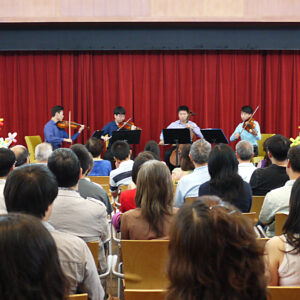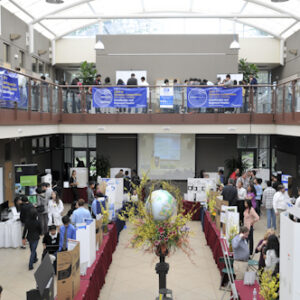In mid-December, the Lucile Packard Children’s Hospital (LPCH) at Stanford University sent over an art curation and interior design team to select art to display in different parts of the hospital.
The Harker School’s lower school art department has had students involved in displaying art at the hospital for several years, ever since Eric Hoffman, lower school art department chair K-5, asked his students for suggestions on where their art could be displayed back in 2008. Hoffman contacted LPCH on a student’s suggestion, and after months of planning with Susan Gray, administrative project manager at the hospital, and display specialist Ted Cohen, student works premiered in spring 2009.
The art is switched out occasionally, and the team from LPCH came to Harker to select the newest pieces. “We had displayed everything in the conference room at the lower school campus, and when they came in, they were truly surprised, and very, very happy,” said Hoffman of the team’s visit. “This particular ceramics project is one we’ve been developing for about a year.”
The grade 4 art students made ceramic desserts as part of this year’s art curriculum, and the LPCH team thought they looked good enough to eat. The students did, too. According to Hoffman, his morning classes had been working on decorating their ceramic pieces, and there was a whole table full of them when the afternoon class came in.
“They thought it was the best thing they’d ever seen,” Hoffman said. They even asked who had done the pieces, and Hoffman told them that they had – this was the work of their classmates, and their pieces were looking just as great. Part of the LPCH’s team’s visit also involved a discussion of LPCH’s expansion – the hospital is going to have more wall space, and the team is rethinking where and how to display artwork.
The ceramics dessert project the grade 4 students did inspired some spur-of-the-moment brainstorming. “Normally we display our 3-D work there for a year or so, and when they saw this dessert project, they started playing with the idea of taking it and putting it on permanent display in the cafeteria,” Hoffman said, something the team had not intended on when they first arrived at the school.
For the new wall space in LPCH’s clinic, the team also selected about 45 pieces of flatwork. Looking toward the future, Hoffman believes they will “absolutely be involved” with the project five years from now and beyond. “Giving to our community is so important,” he said. “I don’t know a better way to do that than to make people laugh and smile. Especially in a hospital situation.”











